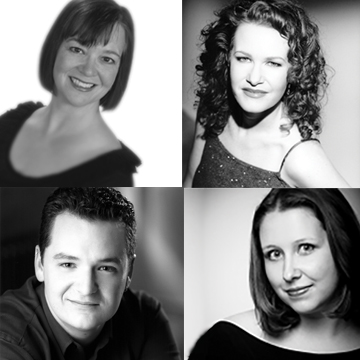This event is from the archives of The Notice Board. The event has already taken place and the information contained in this post may no longer be relevant or accurate.

Music at Noon Series: Janet Youngdahl, soprano; Sandra Stringer, mezzo soprano; John Conlon, baritone, Carolyn Herrington, piano
12:15 pm, University Recital Hall
Free Live Concerts Presented by the Department of Music
The beloved 24 Italian Art Song collection has a colorful history. Most famous as a teaching guide, the publication was first issued in Rome by Ricordi in 1885 as Arie antiche ad una voce per canto e pianoforte. The editor, Alessandro Parisotti, a Roman voice teacher and collector of songs, has earned notoriety because it appears he misattributed several of the works to earlier, more well known, composers. Parisotti himself is presumed to be the composer of ‘Se tu m'ami’, which he attributed to Pergolesi, while the musical setting of ‘Se i miei sospiri’ is not by Stradella, but by the French composer and impresario, Fétis. The value of the collection rests on its pedagogical appeal and the approachability of the repertoire, but also on the sheer beauty and variety of the songs. The collection was republished in 1894 by G. Schirmer as the Anthology of Italian Song of the Seventeenth and Eighteenth Centuries, and has been reissued several times, most recently in 1991 as well-researched edition by John Glenn Paton for Alfred Music Publishing. This new edition clarifies the compositional history of several of the songs and offers singing students word by word translations, a pronunciation guide using the International Phonetic Alphabet (IPA), and accompaniments that reflect the historical origins of the songs.
The earliest works in the collection hail from the first glimmers of Italian Baroque solo song. The aria by Giulio Caccini, ‘Amarilli mia bella’ was published in 1602 in Florence as part of his influential work Le Nuove Musiche, a collection that includes an outstanding preface discussing ornamentation techniques and new arias with basso continuo accompaniment intended to be performed by solo singers and either a theorbo (a very lengthy lute) or a harpsichord player realizing the figured bass lines. In essence, these early songs were highly improvisational works, with the harmonies created on the spot by the instrumentalists and the melodies creatively embellished by the singers.
Many of the arias on this concert are drawn from early operas; the Monteverdi work is an extract of the only remaining section of his lost second opera, Arianna. ‘Gia il sole dal Ganges’ is from Scarlatti’s second opera which premiered in 1680 in Rome while ‘Se Florinda e fedele’ is drawn from his 1698 opera appearing in Naples. The Bononcini aria, ‘Non posso disperar’ was a ‘substitute’ work added to an existing opera by Draghi. Some of the most popular arias in the collection have unspecified origins, the beloved aria ‘Caro mio ben’ that opens our concert is likely drawn from a late eighteenth-century opera by Tommaso Giordani. Some works are drawn from Baroque cantatas, the Carissimi aria ‘Vittoria mio core’ was an extremely popular miniature cantata from the mid seventeenth-century, appearing in over 30 different early versions. Both of the Durante works, ‘Vergin Tutt’amor’ and ‘Danza, danza fanciulla gentile’ were composed as pedagogical works designed to help voice eighteenth- century voice students learn solfege. The sacred text was a nineteenth-century addition and continues to be one of the most popular works in the collection, it has been used as a bel canto display piece for famous singers for over a century.
The 24 Italian Aria collection is a testament of vocal beauty and compositional style from 1602 through the mid nineteenth-century. The collection serves to introduce students to a wide variety of repertoire and carries a legacy of vocal style from the beginnings of opera right into the heart of the bel canto era.
Free admission, everyone welcome
Contact:
finearts | finearts@uleth.ca